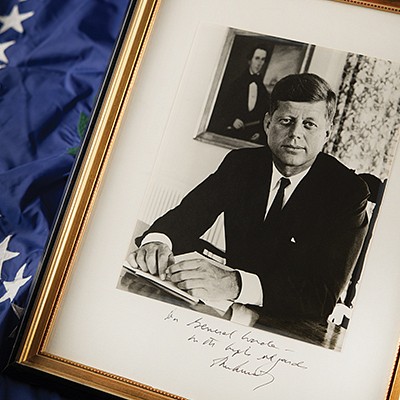Marquis de Lafayette Autograph Letter Signed on the July Revolution (1830)
Two ways to bid:
- Leave a max absentee bid and the platform will bid on your behalf up to your maximum bid during the live auction.
- Bid live during the auction and your bids will be submitted real-time to the auctioneer.
Bid Increments
| Price | Bid Increment |
|---|---|
| $0 | $5 |
| $50 | $10 |
| $200 | $25 |
| $500 | $50 |
About Auction
May 15, 2024
Boasting nearly 800 lots, RR Auction's May Fine Autographs and Artifacts sale is highlighted by a section honoring the anniversary of President John F. Kennedy's birth—including important signed photographs, a remarkable Kennedy family-signed book, a knife used to slice his inaugural cake, a page from his pioneering Peace Corps legislation, and scarce teletype reports on his assassination. RR Auction support@rrauction.com
- Lot Description
ALS in French, signed “Lafayette,” one page both sides, 7.25 x 9, June 12, 1830. Lengthy handwritten letter to Auguste Petit, written by Lafayette from his country estate, La Grange, some weeks before the 1830 French Revolution, expressing his concerns about "the decisive crisis in which the counter-revolution is inevitably throwing us."
In part (translated): "I thank you very much for your good letter, my dear Auguste, and for the strange mandate you have sent me. I hope the newspapers will prove it wrong. The farewell of the bishop to his flock is very remarkable, as they naively reveal the party's line: 'no representative government.' It appears that the presidents will read to each college a letter by the King without royal countersignature in order to influence the elections, which is another incongruity that will have no real effect, I hope. But it seems very likely that only great courage from elections, chamber, and the nation can overthrow the counter-revolutionary spirit of Pillnitz and Coblentz [reference to the monarchist counter-revolution in 1791/1792]. I am very touched by the care with which my dear principals try not to lose the majority of people who kindly give me their votes, and I would tell them, in general, that it is very important that as many people as possible can run for election in the chamber, in order to discourage the faction whose daring progress would gladly refer to the regime from 1788. You will find attached a note written by my son on the business done between your step-father, us and Mr. de la Chapelle, who went from Lagrange to Melun. Our horses are ready as agreed, so that our reciprocal ballot papers will travel rapidly."
Lafayette hopes to see his correspondent around the 21st at La Grange, and gives a description of his farming activities, praising the quality of the wool from his sheep. Then he ends with this prophetical postscript: "I do not know at what point of his reelection process my colleague is. I hope he will succeed, as he is an excellent and solid deputy. All patriotical interests bring back painful thoughts about the loss we have suffered, you of a father and me of a friend very dear to my heart. He would be so worried about the decisive crisis in which the counter-revolution is inevitably throwing us." Addressed on the integral leaf in Lafayette's hand. In fine condition, with a strip of toning to the lower right edge, and seal-related paper loss to the integral address leaf.
After the nomination of the ultra-royalist Jules de Polignac as prime minister in 1829, King Charles X triggered a major political crisis with many tensions between the King and the Chamber. The King decided the dissolution of the Chamber, in the hope that the new vote would bring a monarchist Chamber. The new Chamber was even more republican, and pushed the King into governing by decrees. That would trigger the 1830 Revolution in which Lafayette would have a preeminent role. - Shipping Info
-
Bidder is liable for shipping and handling and providing accurate information as to shipping or delivery locations and arranging for such. RR Auction is unable to combine purchases from other auctions or affiliates into one package for shipping purposes. Lots won will be shipped in a commercially reasonable time after payment in good funds for the merchandise and the shipping fees are received or credit extended, except when third-party shipment occurs. Bidder agrees that service and handling charges related to shipping items which are not pre-paid may be charged to a credit card on file with RR Auction. Successful international Bidders shall provide written shipping instructions, including specified Customs declarations, to RR Auction for any lots to be delivered outside of the United States. NOTE: Declaration value shall be the item’(s) hammer price and RR Auction shall use the correct harmonized code for the lot. Domestic Bidders on lots designated for third-party shipment must designate the common carrier, accept risk of loss, and prepay shipping costs.
-
- Buyer's Premium



 EUR
EUR CAD
CAD AUD
AUD GBP
GBP MXN
MXN HKD
HKD CNY
CNY MYR
MYR SEK
SEK SGD
SGD CHF
CHF THB
THB





